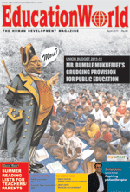 I loved your April cover depicting finance minister Pranab Mukherjee as Mr. Bumble (EW April cover story ‘Mr. Bumble Mukherjee’s grudging provision for public education’). It’s an apt anal-ogy to compare Mr. Bumble’s famous ‘More?’ admonishment to Oliver Twist when he asks for a second helping, with Mukherjee denying India’s children adequate national resources in Budget 2011-12. Indeed like the callous Mr. Bumble, Mukherjee has failed to provide sufficiently for poor children who are forced by circumstances to attend crumbling, dysfunctional government schools in which teacher truancy is normative and learning outcomes are abysmal.
I loved your April cover depicting finance minister Pranab Mukherjee as Mr. Bumble (EW April cover story ‘Mr. Bumble Mukherjee’s grudging provision for public education’). It’s an apt anal-ogy to compare Mr. Bumble’s famous ‘More?’ admonishment to Oliver Twist when he asks for a second helping, with Mukherjee denying India’s children adequate national resources in Budget 2011-12. Indeed like the callous Mr. Bumble, Mukherjee has failed to provide sufficiently for poor children who are forced by circumstances to attend crumbling, dysfunctional government schools in which teacher truancy is normative and learning outcomes are abysmal.
As you’ve rightly analysed, the middle class has seceded from the government school system by creating a parallel private school system for its children. And Mukherjee and the country’s entire political class is part of that middle class which has abandoned government schools in favour of private institutions. So they don’t really care about government schools and public education.
Pradeep Mathur
Delhi
Library movement call
Thanks for your special report ‘Summer reading lists for teachers and parents’ (EW April). The books recomm-ended are excellent and indeed a treasure trove. But the greater challenge seems to be to get teachers to read. Ill-read teachers are a national malaise. They seem to think it’s enough for them to read prescribed textbooks and regurgitate old notes in the country’s classrooms.
Another challenge that needs to be addressed urgently is the lack of libraries and reading rooms in govern-ment schools. It’s unimaginable not to have a library — a house of learning —in a school. The government must immediately initiate a scheme to establish libraries in all government schools.
Shikha Deshpande
Mumbai
Drawing the line
Re your postscript ‘Self-defeating value premises’ (EW April), I hope your disappo-intment with the extravagant lifestyle supplements published by the business press is noted by your collea-gues in the media. Leisure, lifestyle and travel-related supplements in magazines are setting parameters for the ‘good life’ which few can afford, with active backing of the booming luxury products industry.
Projection and promotion of sybaritic lifestyles is manifest not only in business magazines but all publications in which advertising drives editorial decisions. Sales, profit, etc are fine and essential, but a line needs to be drawn on how much editorial compromise should be made. If this issue is discussed rigor-ously among editors, perhaps we can see some tempering and toning down.
N.M. Satish
Bangalore
Appreciative words
I enjoyed reading your cover story ‘Pearson Group’s megabucks rollout’ (EW March). Thanks also for the special report ‘ASER 2010: Shocking primary learning report card’. Similarly your February cover story on the DPS schools showed a good understanding of the eagerness of high-potential Indian children to excel.
I truly appreciate your contribution, experience, capability, sincerity and hard work in the noble cause of quality education for all.
Rajendra Mishra
School of Scholars, Yavatmal (Nashik)
Systemic disease
The importance of the humanities in education can never be overstated (Teacher-2-Teacher essay ‘Dangerous humanities neglect’, EW March). Because of early streaming, the vast majority of bright students struggle to understand their immediate environment and pursue learning with a narrow perspective.
Our children and/or teachers are not at fault for this. Early streaming and premature specialisation is a systemic disease in education policy. One of the remedies is to establish good libraries in all schools and colleges which will give teachers opportunities to improve their breadth of knowledge and at the same time allow children to read beyond the curriculum.
K. Harindranthan
Headmaster, Ivy League Academy
Hyderabad
Brilliant analysis
I enjoyed reading Manish Sabharwal’s Expert Comment column entitled ‘RTE Act: Mission impossible’ (EW March).
Please send copies of this column to the country’s top politicians and law makers including the prime minister, president, HRD minister, Sonia Gandhi, Rahul Gandhi, MPs and Union HRD ministry officials. Hopefully someone will see the light and act on it.
Thanks again to Sabharwal for his brilliant analysis of the flawed RTE Act.
Raghu
Bangalore
DPS success secret
Your cover story on the Delhi Public School (DPS) chain (EW February) is a repeat of similar ‘success’ stories across the country, where the need for mass education is ignored and educa-tion of 5 percent of urban upper middle class India is projected as grand success.
The success of DPS schools is based on its “self-confessed USP” — the DPS Society’s connections with the high and mighty in governments at the Centre and in the states. This is the secret of the multiplication of its branches country-wide which, contrary to your assum-ption, is no yardstick for success.
In our country where 95 percent of children are deprived of quality education, the elite needs to be more charitable in its approach and perhaps start schools, train teachers, make the profession better paid and provide proper infrastructure to cater to the needs of the hugely deprived majority in our villages and city slums.
Parwez Samuel Kaul
Principal, Tyndale-Biscoe and Malli-nson Educational Society
Jammu & Kashmir